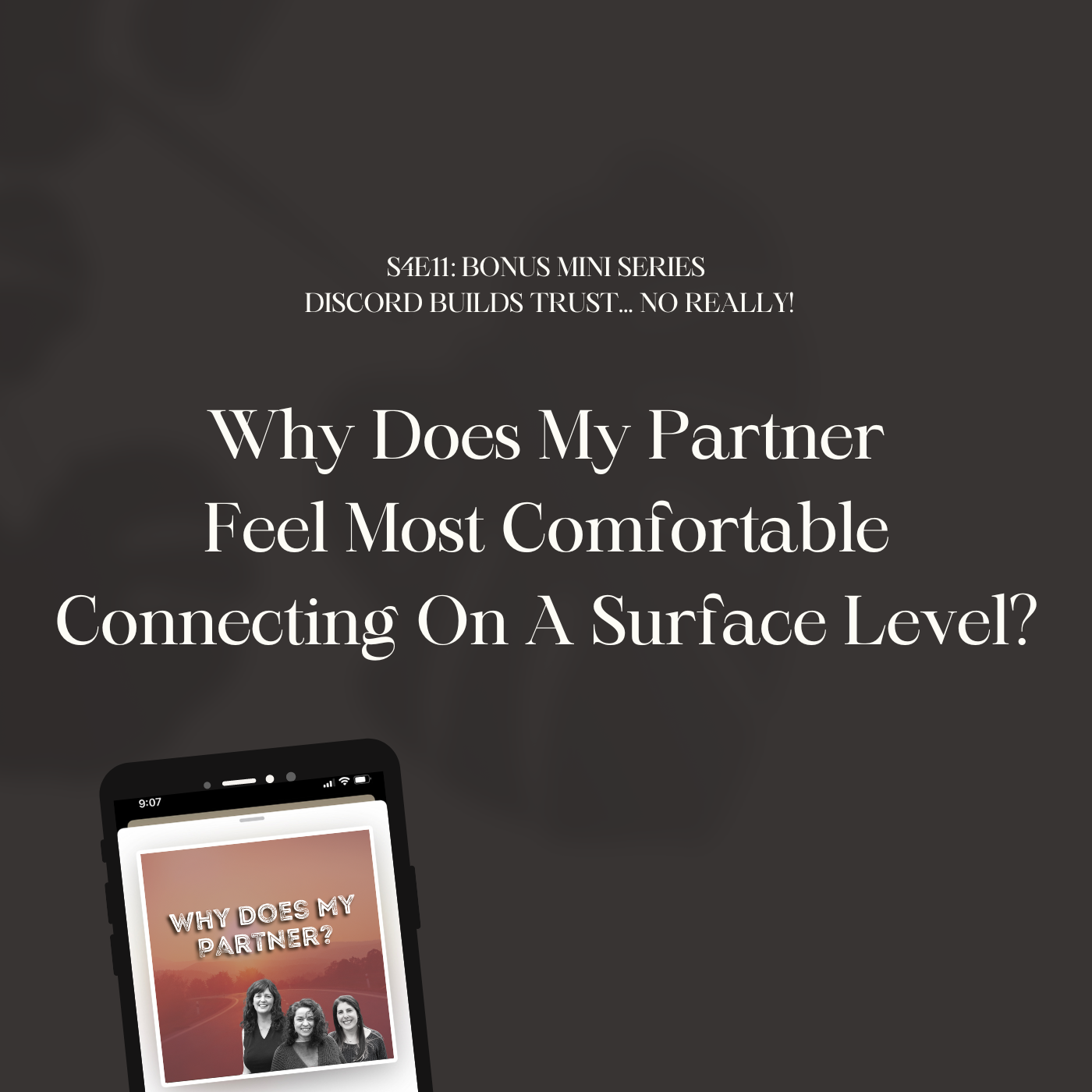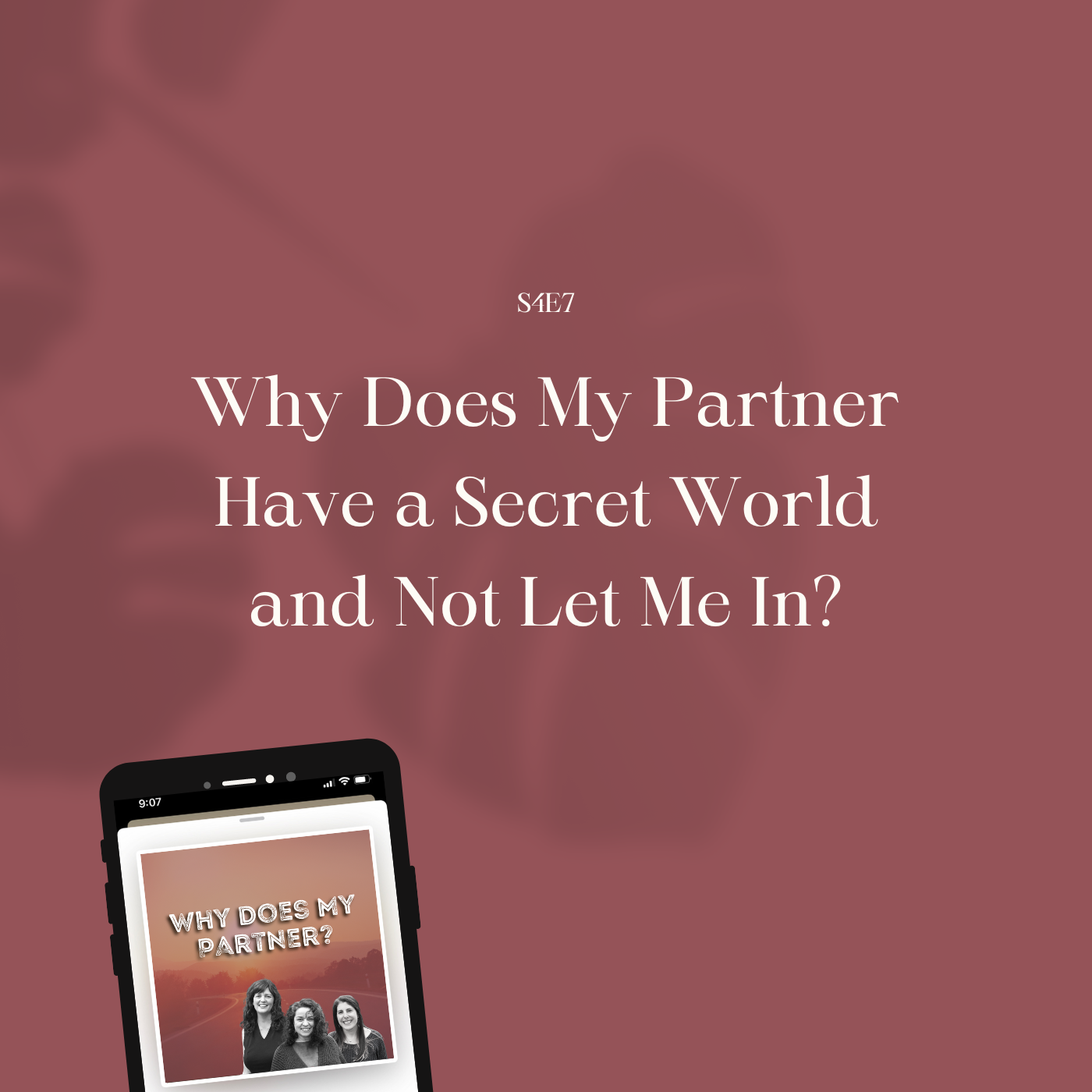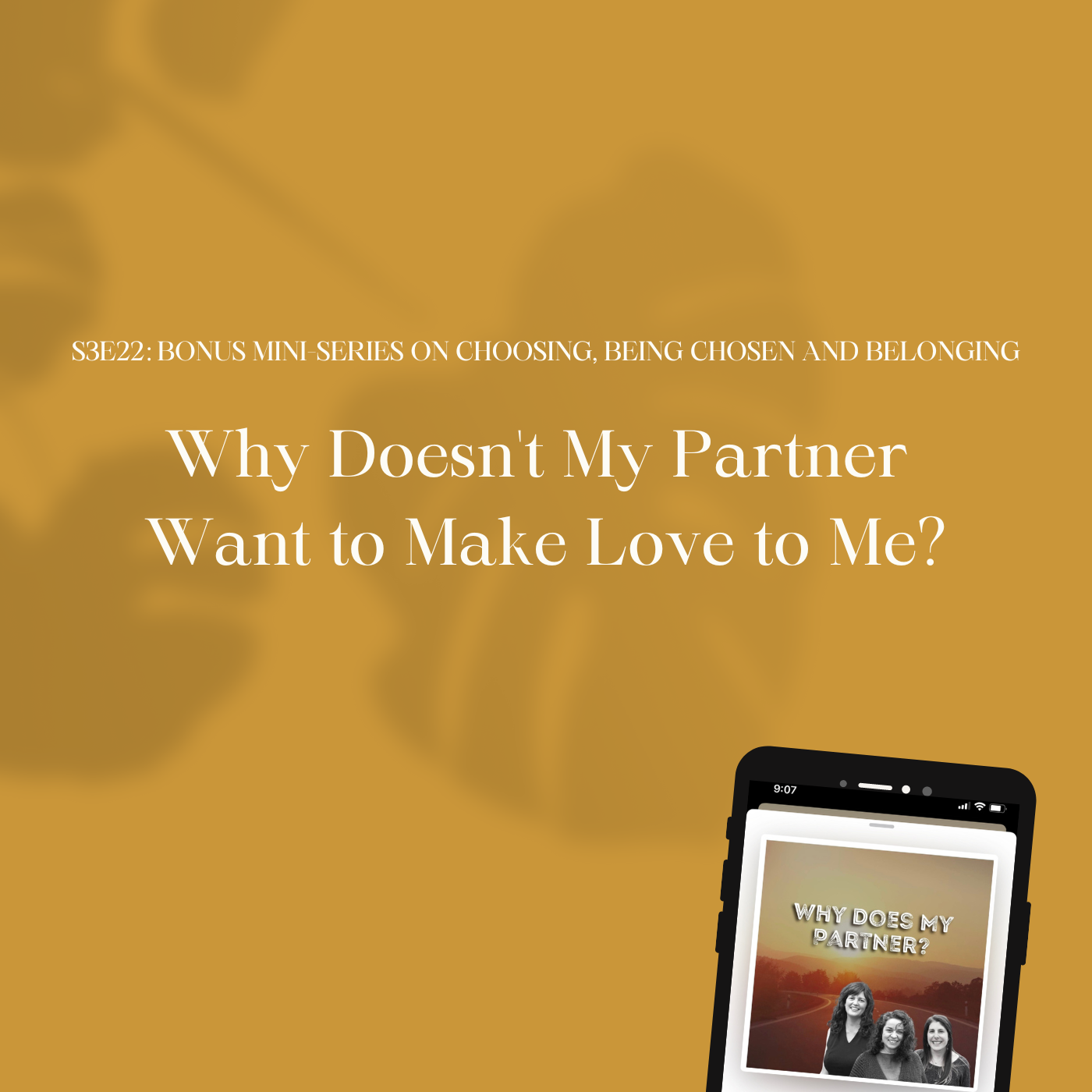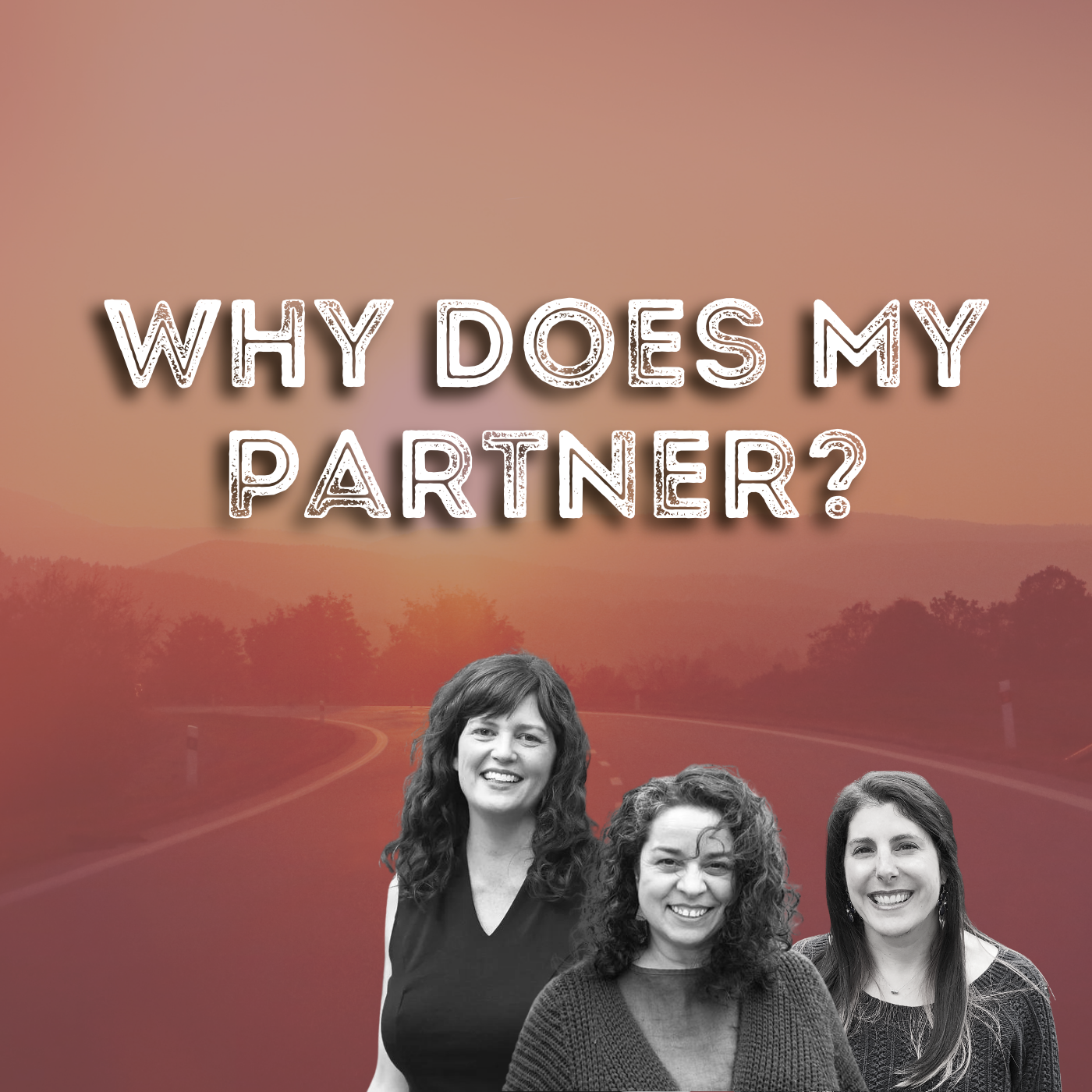We answer questions from people who want help in relationships. These questions echo the conversations that take place over and over again in our therapy offices and take us on a dive deep into the skills at the heart of relational intimacy, greater health, and fulfillment.
send us your question to explore on a future podcast episode
this podcast is not a substitute for therapy with a licensed provider

Bring Up Safe Topics to Solve a Problem When There Are Hidden Issues Not Being Discussed
Hello and welcome to episode two of our mini-series, Discord Builds Trust…No Really!
It’s such a natural, human thing to want to avoid conflict. We all do it! But when we do, we’re missing the chance to have a new experience of trying something hard with someone we love, and finding out that we can do it. That’s why we call it earning trust.
Our bodies and our brains are primed to remember past struggles and do everything they can to protect us by avoiding the same thing happening again. That doesn’t just apply to our own lived experiences, but also to the generations of learning that have been passed down to us from our ancestors. They teach us that certain things aren’t ok to bring up, are dangerous to even think or feel. That’s what Resmaa Menakem is talking about when he says, “Trauma decontextualized in a people over time can look like culture.”
In this series, we’re inviting you to become more aware of these learned beliefs and to sit with them with compassion and kindness. When you do, you have a golden opportunity to blend that learning with other parts of your brain that can take in the world around you as it’s happening right now.
You may want to try this exercise from Dan Siegel, which we share in today’s episode. It’s an acronym called BASIC: Behavior, Affect, Sensation, Image, Cognition. Take it one piece at a time, in any order, asking yourself the questions and observing with curiosity and kindness:
Behavior: What am I doing right now? Is my body being pulled to move, or not move in some way?
Affect: What am I feeling? Can I notice it and give it a name?
Sensation: What are my five senses taking in, and what am I feeling in my body?
Image: what images come to mind when I sit in this place? Pictures? Sense memories?
Cognition: What thoughts am I having? What meaning am I making up about what’s going on inside and around me right now?

Feel Most Comfortable Connecting on a Surface Level
We’re back, dear listeners, as promised with a bonus mini-series: Discord Builds Trust…No Really! We’re not kidding with you on this one. So then why are we sometimes more comfortable with superficial, surface level topics? We’re opening up this conversation by acknowledging that intimacy is hard, and vulnerability can be scary, and wait – just what is a surface level topic, anyway? The truth is, if you’re feeling like there’s a mismatch between you and your partner on how deeply you’re connecting, there’s a lot of reasons why that could be the case. What feels comforting and close to you might feel invasive and controlling to your partner, and what is light and playful to them could feel superficial or avoiding to you. In these moments of discord, when our visions of what we want our relationships to look like come into conflict with who our partners really are, that’s when we can put aside our agendas and approach the conversation with curiosity and connection, with a real desire to learn something new about our partners and offer them the opportunity to learn something about us, too.

Become More Needy the Healthier I Get and the More I Try to Establish Healthy Boundaries
Here it is folks, our last episode of season 4! Today’s conversation sums up so much of what we’ve been talking about this season, from slowing down and having the tough conversations, to building trust, to what does it really mean to practice boundaries, anyway?

Need Sex to Feel Connected While I Need to Feel Connected to Have Sex
Welcome back to the WDMP Podcast. Today’s question leads us into exploring what we each understand sexual intimacy to mean, and what we can do if that understanding doesn't seem to line up with our partner’s. We’re encouraging you, dear listeners, to start to learn about and understand your own sexual templates: what are your likes and dislikes, what are some of the beliefs you have about what those preferences mean, and what in your history has led you there? When you and your partner each engage in that personal work, then there’s an opportunity to talk to each other, confront the projections that might be going on, and come to a place of greater intimacy and understanding.

Tell Me What Upsets Them
Welcome back to the WDMP podcast. Today’s listener question asks about a partner who says there’s nothing wrong, but the asker is worried he’s holding back. We take this into a discussion about trust, and how embracing discord gives you an opportunity to strengthen a relationship. We cover what it means to repair after discord, what the research is telling us about conflict and repair, and how often we can really expect that repair to happen…at least in the way we were expecting it.
Today’s Resource is The Power of Discord by Ed Tronick and Claudia Gold

Have a Secret World and Not Let Me In
Would you know everything about your partner? Like, really, really everything? There’s a delicate balance in every relationship between the intimacy of knowing each other deeply and keeping the magic alive with a bit of mystery. In today’s episode, we get into how intimacy comes from knowing a lot about our partner, which makes us feel safe, while mystery – leaving some things unknown – brings the thrill of discovery, intrigue, and passion. Too much safety, and you might not have enough passion, but too much mystery can lead to feeling unsafe and insecure. That’s where we find today’s question asker, who wonders what’s going on when their partner seems to disappear into his inner world, leaving them behind. We discuss some of the possible obstacles to sharing and get into what it actually means to pay attention to your own internal experience. Finally, we finish up with an offer for you to get curious and open up a conversation with your partner that invites closeness and discovery.
For those wanting to learn more about mystery and intimacy in relationships, here’s Esther Perel’s book Mating in Captivity, as well as her Ted Talk, “The Secret to Desire in a Long-Term Relationship”

Always Have to Get Their Way
Welcome back to the WDMP podcast! Rebecca is bringing the question today so that we can go deeper on the language of “power over, power under, and power with.”
We live in such a hierarchical, win-or-lose society, it's no wonder that we learn to think of power as a zero-sum game, where we compete for who has more control, more influence, more freedom to act. But when we learn to switch to power-with thinking, where power is an abundant, shared resource, all of a sudden it’s a lot more messy, a lot less black and white, but there’s room for everyone’s voice to matter, and to have something important to say.
So how do you bring this power-with viewpoint into your relationship? You guessed it, it’s about vulnerability. We’re inviting you to let go a little bit of your fear of losing power, and trust that when you empower others, it empowers you too.
Resources from this episode:
All About Love: New Visions by bell hooks
Brené Brown's TED Talk, the Power of Vulnerability
Sand Talk: How Indigenous Thinking Can Save the World by Tyson Yunkaporta

Why Do I Take Care of My Partner When They Apologize to Me?
Can remorse be empowering? Spoilers for today’s question, which comes from a listener who finds themselves doing the comforting, when it’s their partner who was doing the apologizing. What’s up with that? Realizing that you’ve hurt someone can bring up feelings of shame and guilt, especially when it’s someone you love. But letting that shame take over can take the focus off doing the repair work you and your partner need after that hurt. We discuss where that shame comes from, and how the alternative – remorse – actually helps you get out of feeling social threat and lets you hold both you and your partner a little more tenderly.

Complain When I Play Golf
It’s a fun one today on the WDMP podcast as we answer a question that’s sounds at first like it’s about hobbies and taking time for things we enjoy, but really gets down to how we distribute resources in our relationship. We discuss how conflicts over fairness can come up when one or both people in a couple are feeling depleted, anxious, or envious, and how to get out of that trap. We’re talking skills like getting curious, making You-turns, and direct requests.

Interracial Relationships
Welcome back to the WDMP Podcast. Instead of a regular question, today we're answering a listener's request to talk about the dynamics between interracial couples and the conflicts that arise from their cultural differences.
We take it as an opportunity to slow down and acknowledge that there's so much that comes with this big, heavy topic. There's the weight of inherited hurt and oppression, the weight of silenced voices and marginalized bodies. Of trying to do things differently - maybe even better - than those who came before us. We discuss how this situation can be ripe for misunderstanding as each person brings generations of meaning and experience into the relationship, which could be totally different from their partners. Finally, we share an embodied practice for pausing, checking in with your inner vibrations, and letting yourself imagine what could be and being honest about what you don't know.

Get Defensive and Justify a Friendship
Welcome back to the WDMP podcast! Here in our second episode of season 4, a listener brings us his concerns about his wife’s friendship with a lesbian coworker. We get into topics like feeling dismissed, building trust, and navigating bumpy conversations with your partner where there are lots of tender feelings on both sides. We discuss how healthy boundary-setting isn’t about controlling your partner, it’s about knowing your own limits of comfort, and talk about a way of negotiating boundaries with your partner that helps you both slow down, stay curious, and turn this conflict into an opportunity for greater intimacy.

Have No Interest In Being More Relational
We’re back with season four and starting off with the big ones. Today’s question gets Jules, Vickey, and Rebecca asking, “what the heck does ‘relational’ even mean?” It’s a word we use all the time here on the WDMP podcast, so could it really be that you and your partner could have totally different ideas of what it means to be relational? And if that’s true, how do we turn that discovery into an opportunity to co-create our shared relational space?
In true WDMP style, the answers we explore are equal parts brain science, you-turns, and a gentle invitation into vulnerability and a deeper connection to yourself.

Not Want to Make Love to Me
Welcome back to the WDMP podcast and to the third episode in our Mini-Series on Choosing, Being Chosen and Belonging. This episode covers the topic of sexual intimacy in relationship, if that affects how, when, or if you choose to listen we want you to know that ahead of time.
In this episode we're answering the question "Why Doesn't My Partner Want to Make Love to Me?" We're discussing rejection, expectations, and vulnerability. We're inviting listeners to wonder what happens in your body, or floating in the back of your mind, as you think about how likely it is for you to take sexual information (the gesture, the look, the initiation, etc) personally and explore what stories you are making up and loosen the grip those stories have on you so you can enter these conversations with curiosity/interest. We offer you-turns and tools to help you meet vulnerability with vulnerability.

Look Outside for Things to Make Them Feel Good About Themself
Welcome back to the WDMP podcast and to the second episode in our Mini-Series on Choosing, Being Chosen and Belonging.
In this episode we're answering the question "Why Does My Partner Look Outside for Things to Make Them Feel Good About Themself?" In answering this question we're discussing self-worth and how self-worth is buoyed up if you have an inner sense that you're not-enough. We explore the ways we may replace our absence of experiencing belonging with attempts to "fit in" and explain the difference. Belonging celebrates us for all of the different aspects of ourselves, allowing us to trust we can move through conflict and discord while honoring each other's differences. We explore a range of upside down forms of boosting one's esteem and offer our typical you-turns for listeners to explore.

Prefer to Keep the Status Quo of Distance in our Relationship
Welcome back to WDMP podcast and to the first episode in our Mini-Series on Choosing, Being Chosen and Belonging.
In this episode we're answering the question "Why Does My Partner Prefer to Keep the Status Quo of Distance in our Relationship?" We're talking about vulnerability, safety, and taking emotional risks without guarantee of outcome. We discuss how vulnerability is embedded in listening and receiving just as much as it is in sharing, the difference between provocative and responsible distance taking, and how to incorporate time-outs by developing a shared relational language. We also talk about a way of framing status quos. And, as usual, we share an impactful you-turn to explore.

Why Does My Partner’s Mood Influence My Mood So Much?
Does your partner ever give off an energy, even without saying anything, that rubs off on you? Maybe it makes you feel like they’re mad at you, or you simply adopt the mood that they’re in. In this episode, Jules, Vickey and Rebecca discuss the concept of “emotional contagion” and why we are affected by the unspoken moods of others, and how to navigate and communicate about this issue in your relationship with your partner.
This is our final episode of season 3, thanks for listening for 3 seasons!

Why Does My Partner Say I'm Therapizing Them?
In this episode, Jules, Vickey and Rebecca answer a listener who asks the following question: “Recently, when my partner and I have been having conflict, I try to come from a place of curiosity, talking to them and saying things that I've noticed and then asking why that might be. They tell me they feel I'm trying to be their therapist. I can understand why they could see it that way, but it's not my intention. I've told them it isn't my intention that I'm just trying to understand their point of view, but they say it feels like I'm not trying to understand, but to analyze. Aren't those the same thing? Do you have advice for balancing between coming from a place of curiosity but not making them feel like I'm trying to be their therapist?”

Why Does My Partner Set Me Up To React?
In this episode, Jules, Vickey and Rebecca answer listener question: “Why does my partner set me up to react when he makes controversial statements that are hurtful or mis-representational and expects that I don't react? And then when I react, he tells me that I'm being angry and that I'm wrong. And I always create a fuss about everything when I feel that if he had not said what he said, there wouldn't be an issue.” Is it about wanting to feel “right”? Can someone even make you feel a certain way? Is your interpretation about your partner’s tone, words, your own interpretation, or some combination of these things? Can you partner bring up something that's hard to hear in a way that wouldn't set you to react? When you know something is provocative and you do it anyway, what's your goal? Is this about connection and vulnerability? Join us for a lot of you-turns!

Why Does My Partner Interpret Disagreement As Criticism?
Does it seem like your partner gets defensive and/or hurt most times when you disagree? Have you ever wondered what could be behind that feeling for them and how to create a space where you are still connected and feel safe even in moments of disagreement? In this episode, Jules, Vickey and Rebecca discuss what could be happening internally with your partner, ways to examine your own words and intentions, and how to diffuse potential conflict and hurt feelings in these moments using compassion and communication.

Why Does My Partner Want to Open Our Relationship?
Have you or your partner ever wondered how about opening your relationship? In this episode, Jules, Vickey and Rebecca cover not only some of the many reasons partners might explore non-monogamy, how to communicate in a connected way about it, how to explore it carefully—and how to express if it doesn’t feel right for you. They share their experiences in working with a variety of partners in open relationships and offer resource material to help guide you through the world of consensual non-monogamy.

